Hamlet
Virtual Reality for the Soul
American Shakespeare Center, Blackfriars Playhouse, Staunton, Virginia
Saturday, January 27, 2018, C–7&8 (center stalls)
Actors' Renaissance Season
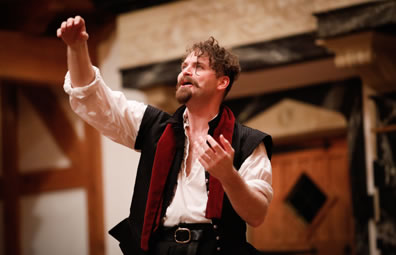
Josh Innerst plays Hamlet in the American Shakespeare Center Actors' Renaissance Season (original production practice) production of William Shakespeare's Hamlet at the Blackfriars Playhouse. Below, the Ghost (Anthony David Lewis) appears to, from left, Marcellus (Lauren Ballard), Horatio (Alli Babich), and Bernardo (Chris Johnston). Photos by Lindsey Walters, American Shakespeare Center.
The musicians leave. John Harrell, bundled in fur, spear tucked under his arm, stands alone, warming himself at a fire kettle on an otherwise bare stage. There's no real fire, but never mind that. And it's warm inside the Blackfriars Playhouse, insulated from the winter air of this Staunton, Virginia, January evening; but never mind that, either. Harrell is playing Francisco, a soldier standing guard on the ramparts of Elsinore in William Shakespeare's Hamlet where 'tis bitter cold.
That's why Harrell is shivering as he begins to speak—not Shakespeare but simple instructions about no photography, turn off cell phones, let's give an appreciative hand to the sponsors. He also introduces us to the prompter off to the side of the deep-thrust stage and explains that this production is part of the American Shakespeare Center (ASC) Actors' Renaissance Season during which the company of 12 actors using only cue scripts (their parts plus a couple lines prior to their own lines) puts on five plays without a director or production team (they use no sets and costume themselves, for this play in Elizabethan garb). They also get only about 40 hours total of rehearsal time per play, the production method of Shakespeare's day. When an actor forgets a line, he or she says "prithee" and the prompter gives a couple of words so that "we can continue acting," Harrell says.
Traditional theater goers may ask, where's the immersion, other than Harrell shivering there on the stage of a warm playhouse? Well, traditional as in 20th century theatergoers. The immersion is the Blackfriars Playhouse itself. At the world's only re-creation of Shakespeare's own indoor theater, the ASC uses Elizabethan/Jacobean staging conditions for all its productions. This means no stage lights (audience and actors share the room light), no electronics, no digital effects, and no sets other than a few easily moveable props. It's just the actors, their costumes, their scripts, their music, and the audience, some of whom are sitting on "gallants' stools" on the sides of the stage. This is not supposed to be virtual reality; this is live theater. This is not a journey into the director's mind and his or her 21st century concepts; this is a journey into Shakespeare's mind and his 21st century concepts. Indeed, in these "Ren Season" productions there is no director's mind to mine.
Harrell finishes his instructions and turns his attention to that nonfire. We hear a moan that sounds like a Scooby-Doo cartoon ghost. Harrell looks about, spear poised when, suddenly, a man wearing a white sheet pops through the curtain at the back of the stage. "Nay, answer me: stand and unfold yourself," Harrell shouts at the specter. "Long live the king!" the ghost moans in reply. Harrell pauses looking puzzled. "Bernardo?" he asks, and the ghost throws off his sheet to reveal Chris Johnston, who affirms, "He" is Bernardo. We've just been introduced to the star comedy team of this Hamlet. In addition to Francisco and Bernardo, Harrell and Johnston play, respectively, Guildenstern and Rosencrantz (beyond this play and into Tom Stoppard's companion piece, Rosencrantz and Guildenstern Are Dead, opening next in the Ren Season repertory), and First and Second Gravediggers. Never mind that, because Francisco is leaving and Marcellus (Lauren Ballard) and Horatio (Allie Babich) are entering. They begin talking about a supposedly real ghost haunting the premises, when the stage doors go bang, a supernatural hum sounds from around the theater (made by various actors' vocal chords), and that real ghost appears, wearing armor, with a face white as death and eyes that have seen horrors in his otherworld.
Now you're the one shivering. Now you're immersed into the world of this ghost, just as you'll soon be immersed in the troubled mind of Hamlet and the guilty mind of Claudius and the practical mind of Gertrude and the naive mind of Polonius and the incensed mind of Laertes and the fractured mind of Ophelia and even the mesmerized minds of the gallants sitting on their on-stage stools. You are watching Shakespeare's Hamlet from the inside out, and at the play's end as you are rubbing your palms shaded red from the hammering of your applause, you are breathless, psychologically wrought. With what little intellectual reasoning you have left (so thoroughly have your emotions overtaken your existence) you wonder if theater—any theater—can get better than this.
Pause. Breathe. Reiterate. Seven days have passed since that moment, and I'm not only still pondering this production's place in all my life's Shakespeareances, I'm still feeling the vibrations in my cheeks, the tingles in my gut, the intensified thumping in my heart, and my stinging palms as I rerun through my mind's eye Hamlet and Gertrude in the closet scene, Ophelia's madness, Claudius watching the Mousetrap, Hamlet and Horatio just being Hamlet and Horatio, and that Ghost. It's theater so immersive you can't get it out of your own system.
I know all this sounds like hyperbole or even puppy love, and take it that way if you must, but here is the most astonishing thing about this, the 24th stage production of Hamlet I've seen (among 498 staged Shakespeare productions): how thoroughly collaborative is this ensemble to attain such a thematically immersive rendering of such a complex play. Remember, these 12 actors gathered as a company for the first time a couple days before New Years; after a table read-through, the troupe had two weeks to mount both Hamlet and William Shakespeare's Richard II before their official opening performances. This particular performance is one week into Hamlet's run. Many of these actors have worked together before, but a few met each other for the first time this season. All, however, are experienced with Shakespeare's text, skilled in speaking his verse, and inculcated with the Blackfriars MO, and they rely on their shared intelligence and trust in each other to create a dramatically and thematically cohesive production.
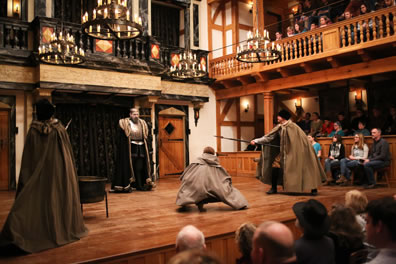 David Anthony Lewis's portrayal of the Ghost exemplifies the spirit of this company. He not only looks scary with the white face and peeling-skin hands (Lewis strolls through the audience as he leads Hamlet away), he specifically acts out the stage directions imbedded in the lines Horatio and the soldiers speak. His hollow eyes express annoyance when Horatio "charges" the Ghost "by heaven" to speak. With the next sighting, Horatio softens his tone, imploring the ghost to deliver its message, and Lewis's expression turns to trust. He opens his mouth when we hear a cock crow, and Lewis starts "like a guilty thing upon a fearful summons," as Horatio says, and glides away. When he appears to Hamlet, Lewis's Ghost moves past his son, pausing and turning only when Hamlet says "I'll call thee Hamlet, King, father, Royal Dane."
David Anthony Lewis's portrayal of the Ghost exemplifies the spirit of this company. He not only looks scary with the white face and peeling-skin hands (Lewis strolls through the audience as he leads Hamlet away), he specifically acts out the stage directions imbedded in the lines Horatio and the soldiers speak. His hollow eyes express annoyance when Horatio "charges" the Ghost "by heaven" to speak. With the next sighting, Horatio softens his tone, imploring the ghost to deliver its message, and Lewis's expression turns to trust. He opens his mouth when we hear a cock crow, and Lewis starts "like a guilty thing upon a fearful summons," as Horatio says, and glides away. When he appears to Hamlet, Lewis's Ghost moves past his son, pausing and turning only when Hamlet says "I'll call thee Hamlet, King, father, Royal Dane."
Josh Innerst, one of the most textually perceptive actors I've seen in many Blackfriars Playhouse performances, plays Hamlet. He channels the prince's intelligence into such stage business as scribbling meditations and drawing pictures in his little black book, including the portraits of his father and stepfather he later forces his mother to look upon. Innerst's performance successfully walks the tightrope of a Hamlet who puts on an antic disposition but, already suffering a grief-induced depression, is teetering toward real madness after his psyche takes so many hits (learning of his dad's murder, being tasked with revenging that murder, getting the cold shoulder from the girlfriend he "loved ever"). His "prophetic soul" doesn't like or trust Claudius (Christopher Seiler) but the only sin he assigns to his stepfather is marrying his widowed mother too soon after dad died. That his dad was murdered and by Claudius hammers Innerst's Hamlet hard.
Hamlet is full of famous lines, of course, but Innerst and company whet the essence of what has become cliches by giving them such thoroughly studied character contexts. "To be or not to be" is a meditation from his little black book that Innerst delivers as a trial lawyer might lay out the logic in a final, convincing argument to a jury. "Get thee to a nunnery" becomes more self-abuse than an attack on Ophelia (Shunté Lofton) as Hamlet tears her out from his own heart. In the opening scene the Ghost has his famous triple "horrible," describing how, by being murdered while sleeping, he "no reckoning made, but sent to my account with all my imperfections on my head. O horrible!" Lewis wails impulsively; "O horrible!" he roars angrily; "most horrible!" Lewis croaks out, eyes widened and face trembling thinking on purgatory's "sulphurous and tormenting flames." Lewis makes you experience murder from the victim's perspective.
It burrows deeply into Hamlet's conscience. When he pauses in killing Claudius while the king is at prayer, Hamlet isn't procrastinating or scared or, as Laurence Olivier famously decreed, "could not make up his mind." His father's "horribles" echo in Hamlet's explanation for holding off killing the kneeling Claudius and "send to heaven." This scene is staged with a most apt piece of stage business, too. When he enters, Innerst's Hamlet kneels next to the king to pray. Only then does Hamlet realize Claudius is beside him before he gets up to stab, and not to stab, the king. As Harrell's shivering put us on the castle ramparts, Innerst's kneeling puts us in the castle's chapel: what other public place (where Hamlet could encounter him) would Claudius have the privacy to pray? No minor matter this, for Hamlet will not do what Laertes swears he would do to exact revenge: "Cut his throat i' the church."
Seiler plays Claudius as a busy politician, comfortably in command of his place, other than his brief aside admitting some great guilt (ASC's text-centric productions maintain Shakespeare's specific plot sequences, thus this aside is retained though the script is trimmed for a 2 1/2-hour running time, including intermission—trims so finessed they are hardly noticeable). Claudius's tyranny doesn't erupt until the Mousetrap. As Gertrude (Jessika Williams) becomes increasingly peeved watching the Player Queen (Benjamin Reed) "protest too much," Seiler's Claudius is concerned only that Hamlet is aiming insults at his mother. "Is there no offense in't?" he asks, intending to head off more abuse of his wife. When he sees the murder committed in the play, Claudius's guilty conscience overtakes Seiler's expression, then, coupling the players' enactment with Hamlet's behavior, he directs a murderer's glare at Hamlet. The Mousetrap works to catch the conscience of the king, but it kicks off a cat-and-mouse game of which only Claudius and Hamlet—and Horatio, though Claudius isn't aware of that—know the truth.
Speaking of Horatio, Babich and Innerst display a second-nature affection and familiarity noticeably lacking in Hamlet's interactions with Rosencrantz and Guildenstern and their strained quibbling (how mistaken are Claudius and Gertrude in believing Hamlet's childhood friends retain such affection in him). "O, there be players that I have seen play, and heard others praise, and that highly," Hamlet says starting into another point in his lecture to the players on good acting. The look passing between Innerst and Babich indicates not only that Horatio is the "others" who praised bad work highly, but also that Horatio knows exactly which performance Hamlet is talking about. In his "play upon a pipe" passage with Rosencrantz and Guildenstern, Hamlet tosses the recorder back over his head; Horatio is behind him to catch it.
The knottiest relationship in this Hamlet is mother and son. Williams gives Gertrude a commanding presence, making her a woman of resolve who takes part in Denmark's politics. In the first court scene, Seiler's Claudius hands Fortinbras's threatening letter to Williams; after barely a glance at the contents, her Gertrude rips the letter in two. "So much for him," Claudius responds with some surprise. Williams' Gertrude herself expresses surprise when Claudius insists that Hamlet not return to Wittenberg, but she quickly approves. After all, as Claudius later says, she "almost lives by [Hamlet's] looks." We can't know her motives for marrying Claudius so quickly after her first husband's death, but we do know she is both worried over and wearying of Hamlet's harping on that topic. All of this wends into the dramatic composition of the closet scene. So much distress surfaces in this moment because mother and son show so much love for each other even as they pound each other's emotions to a pulp with well-aimed blows of Shakespeare's text. "O Hamlet, thou hast cleft my heart in twain," Gertrude rails at Hamlet, a counterpunch to shut him up rather than a self-realizing anguish.
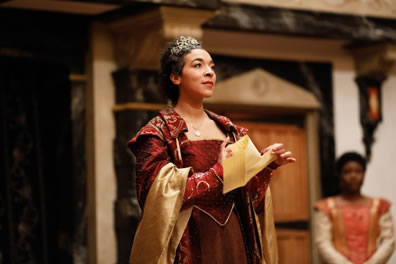
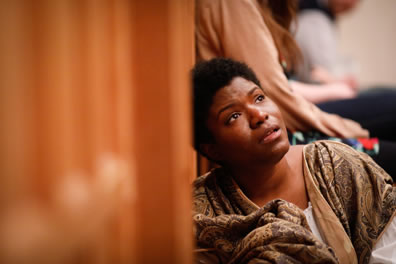
Top, Gertrude (Jessika Williams) rips Fortinbras's letter as Ophelia (Shunté Lofton) watches in the American Shakespeare Center's production of Hamlet. Above, Ophelia in her madness. Photos by Lindsey Walters, American Shakespeare Center.
The Ghost appearing again to Hamlet interrupts them; only this time, the Ghost is in the heavens. I'm not being allegorical. Lewis speaks through a portal in the playhouse ceiling, a trapdoor known as the heavens in Shakespeare's day. This Ghost appears there for one simple reason: Lewis, doubling as the Player King, doesn't have time to get into his whiteface makeup; nevertheless, the decision is also grounded in the text as Hamlet reports how his father's ghost departs "out at the portal." Innerst accommodates Lewis by falling back on the floor in one of Hamlet's frenzied moments so he is looking skyward as the Ghost appears. Lofton's Ophelia adds a further enigmatic layer to Lewis's final ghostly appearance. In her madness she is giving her flowers to various characters and audience members on the stage; she looks up and offers a couple toward the ceiling. All you armchair psychiatrists, have at it.
More important in Lofton's portrayal of Ophelia is her first scene in the play. Polonius (Tim Sailer in a straightforward yet endearing reading of the part) and his kids are a happy family, a unit of genuine affection—brother to sister, children to father—in stark contrast to Hamlet's dysfunctional family unit. Hamlet shares in their affection: at his parting for France, Laertes (Reed) gives him a bro hug, and Hamlet does requite Ophelia's crush "with love in honorable fashion." Polonius isn't being tyrannical with his daughter, for she is a "green girl" in Lofton's playing, and Sailer's portrayal of Polonius gives due respect to his own experience of "when the blood burns," which factors into a protective attitude toward his daughter while also being aware of his family's second-level place in a royal court (even Polonius sending a spy on Laertes marries both motivations). Ophelia is irritated at her dad, but she obeys him to the letter.
Given this foundation of Ophelia's age, temperament, and familial relationships, Lofton delivers one of the most moving and genuine mad scenes I've seen. She ends up leaning against the wall by the gallant stools as Laertes, whom she shunned a few lines previously, looks on her helplessly (and the patrons sitting on the stools look upon the two actors at their feet with rapture). Lofton's Ophelia glances at Laertes and this time recognizes him and hugs him hard. Then her mind wanders off again, and so does she, walking out aimlessly singing to herself, leaving behind Reed's Laertes to deal with his father's mysterious death and his stricken sister. Talk about the disintegration of a happy family: It's all right there in Reed's sobbing Laertes and his subsequent intense hatred for Hamlet (against his conscience, he later realizes).
It's one of many scenes in this staging that represents the consequences of one person's ambition. To gain the crown and the queen, Claudius commits what he thinks is the perfect crime. We, the audience, experience in our own hearts the consequences of that crime through the Ghost's "O horrible!," through Hamlet's depression and his taints of madness, through the peripheral tragedy visited on the Polonius family, through the destruction of the naively cute Rosencrantz and Guildenstern, through the accidental poisoning of a loving mother, and finally through Hamlet's purposeless death: puzzled at why Laertes is cut in the gut by the foil he's holding (the two duelists switched swords in a furious exchange), Hamlet inspects the blade and pricks his finger on its unbated and envenomed point—and then licks his poison-pricked finger. Claudius dies as a consequence of his actions, too, but all of Denmark ends up suffering as well, conquered by Norway's Fortinbras. Greed is a powerful thing, ultimately overwhelming even its disciples.
Hamlet is a powerful thing. Reading the play as a sophomore in college is what hooked me on Shakespeare, so blown away I was by the brilliant poetry and prose, the richly drawn characters, the thematic complexities running through the storyline, and all in a page-turning pot boiler. This ASC production, so pure in its execution of Shakespeare's text, puts me right back in that moment of initial Shakespearean ecstasy. That's right: puts, present tense. Methinks I am still seeing this play in my mind's eye, immersed as I still am in the woe and wonder of it all.
Eric Minton
February 3, 2018
Revisit, March 17, 2018
Seats M—3&4 (back row, left of stage, near the rear)
Is the American Shakespeare Center's Hamlet really as good as that? It's not that I doubt my own impressions of the production or the vibe I pick up in the audience around me; it's that I've never felt comfortable talking in superlatives (that I so often use superlatives is a testament to how much good-to-great theater I see year in and year out), and I always shy away from the notion of "definitive," determined to avoid the term altogether. As Ralph Cohen, ASC founder and director of mission, told me after I saw his company's Hamlet for a second time, productions or even presentations of the same production "are not better; they're different."
Back at the Blackfriars to see Tom Stoppard's Rosencrantz and Guildenstern Are Dead, the third outing of this ASC's Actors Renaissance Season company, wife Sarah and I decided to take in Hamlet again and make it a double-header. In a theater nearly packed to capacity (the evening's R&G would be standing room only), our seats this time are to the side of the stage, far enough back that we're behind some of the action. It's an opportunity to watch the audience as much as the actors, an audience rapt in attention, leaning forward in the balcony and staring intently in the stalls, including a little boy who looks to be about 6 years old, at Josh Innerst speaking Hamlet's "How all occasions do inform against me" soliloquy. If that speech has an audience enthralled, I can't imagine the impact of any of Hamlet's other, greater soliloquies, let alone his closet scene with Gertrude, the Mousetrap, the prayer scene, or Ophelia's madness during which I was rapt on the action rather than watching the audience.
For Ophelia's mad scene, from our seats we cannot see Shunté Lewis's Ophelia when she leans against the wall by the on-stage gallant stools; but we can see Benjamin Reed's Laertes watching her and then, in a brief flash of hope, brightening when Ophelia suddenly—but only briefly—recognizes him. Never before have I cried at a Hamlet.
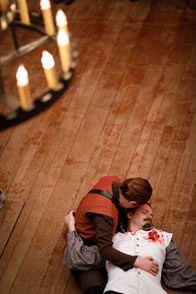
Horatio (Allie Babich) holds the dead Hamlet (Josh Innerst) in the ASC production of Hamlet. Photo by LIndsey Walters, American Shakespeare Center.
OK, so maybe it's only different, or at least my perspective is different. This time I can see Allie Babich as Horatio halfway back into the audience watching for Polonius's reaction in the Mousetrap. She even moves to look around another character who has moved into her sightlines. When the king rises, her Horatio reacts, preparing to draw the dagger Hamlet had given her. I also pick up things I hadn't noticed when we saw it before, including a significant element of the Hamlet-Horatio relationship. After the Ghost's visit, when Hamlet tells Horatio, "There are more things in heaven and earth, Horatio, than are dreamt of in your philosophy," Hamlet grabs at the cross hanging around Horatio's neck, and Horatio defensively yanks it back from him. In the final act, when Hamlet tells Horatio, "We defy augury: there's a special providence in the fall of a sparrow," he gently takes Horatio's cross in his hands, and Horatio clasps his hand, appreciating his appreciation of her faith. The relationship these two actors build in their characters forges the weight of Hamlet's tragedy at play's end as Babich's Horatio cradles Hamlet's head in her lap.
Different can be better, too. Christopher Seiler is electric this time as Claudius, and his can't-pray speech has the power of a volcano on the cusp of eruption, a molten brew of guilt, fear, greed, and conniving. "O, what form of prayer can serve my turn? 'Forgive me my foul murder'?" Seiler's Claudius says with self-incriminating irony. Then distress dawns on his face: "That cannot be; since I am still possess'd of those effects for which I did the murder; my crown, mine own ambition, and my queen." So he tries to pray. And as he does so, Hamlet ponders killing him, his dagger's point poised not behind the king's neck as the iconic image goes but at the king's ear. Good god.
These are the nuanced textual truisms that this production creates out of this well-known play that make it unlike any Hamlet I've seen before; even its own self, the exact same production. This time out seems, well, different than it was when first we saw it. And better.
Eric Minton
March 21, 2018
Comment: e-mail editorial@shakespeareances.com
Start a discussion in the Bardroom



 Find additional Shakespeareances
Find additional Shakespeareances